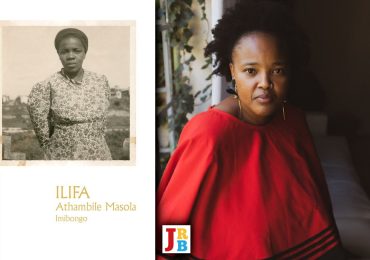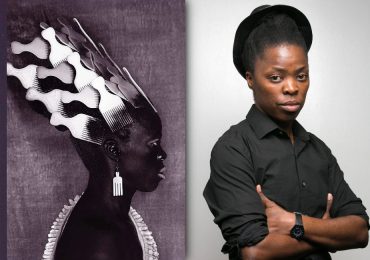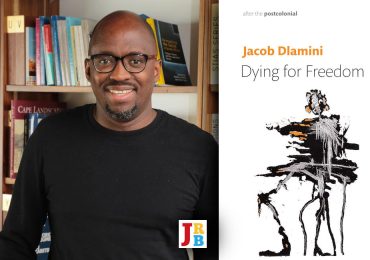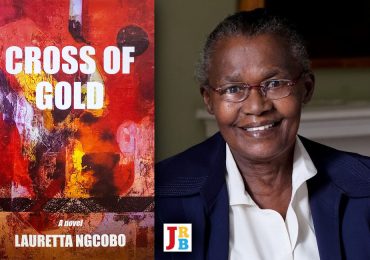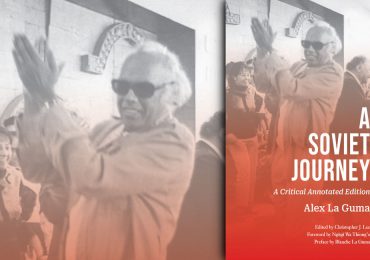The JRB presents an excerpt from Tremor, the new novel from Teju Cole.
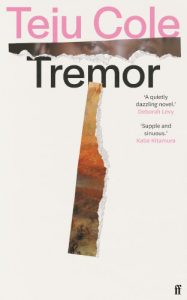
Tremor
Teju Cole
Faber and Faber
How is one to live without owning others? Who is this world for? White people taught us that the world could be dominated by means of religion and warfare, collected for the sake of pleasure and scholarship, possessed through travel, and owned by anyone willing to claim and defend that ownership. How is one to live in a way that does not cannibalize the lives of others, that does not reduce them to mascots, objects of fascination, mere terms in the logic of a dominant culture? The more expansive his interests in the world, the more urgent these questions become. ‘Travel photography,’ ‘travel writing’: to him these have become dead terms and he can’t make them live. Walking through the Medina Koura in the center of Bamako with the camera in his hand he wonders what photographs of such a place can even be. He often tells his students that there is no such thing as a good photograph, not if such a judgment is based merely on how pretty an image is. It matters, he tells them, who made the photograph and what afterlife it has beyond the moment in which it was made. Sometimes the students object. Is he saying that a white person can never photograph in Africa? Isn’t it the right of the artist to make art, to obey the inner creative urges from which any worthwhile art emerges? He turns the question around to them: who taught you that your rights are more important than other people’s rights? The excuses made for the display of African bodies are familiar to him. Those excuses are sometimes blunt and unconvincing and sometimes seductive. One well-known white photographer makes mockingly exploitative work but in presenting it always appends a statement that the work is intended to ‘overturn stereotypes’. Everywhere in contemporary photography is the same old vampirism but now it has good wall text.
In Bamako he gets an email from your son Lucas. They have met only once before, years ago, but now Lucas writes out of the blue. He and his family have just moved to Boston. He wonders if Tunde has advice about living in New England and suggests meeting up for lunch. But the meeting will not really be about advice, thinks Tunde to himself. It will be, they both must tacitly know, to satisfy a curiosity. One seeking to know this person who was so close to his father, the other wanting to know something about the son of his dear friend. Tunde writes back and says it might be possible to meet up in early December or, if not, in January. Lucas responds warmly and they put the correspondence on pause.
The city is hot. The shops have on them names like Coulibaly, Kanté, Touré, Traoré, Keita, names familiar to him, names he has known through the years as the names of musicians, football players, scholars, artists, names redolent of another world with which he feels intimate but from which he has always been distant; and here they are in their ordinary contexts on shop signs and billboards, materializing the dream he’s been having for almost three decades. He goes to see the exhibitions in the Biennial. Outside one of the venues he sees more white men in military fatigues. These ones, he is able to determine, are Serbian, part of the French-led anti-jihadist force soon to be shipped north. In that far corner of Mali they will drop bombs that will never be accounted for. They will kill people for whom no obituaries will be written.
The market is noisy and things are arranged in the stalls in a way that shows evidence of various ways of making do and getting by. Fair to call it precarity, fair to think of it a different way and call it agility. When he sees oranges displayed on a plastic sacking on the ground he finally makes a photograph. And then he makes another, of crocodile ornaments on a monumental gate near the old railway station. Through these days he and Sadako are writing to each other, back in their element and ease. He sends her a portrait made of him by an itinerant photographer. She writes back to say that he looks really happy in the portrait and that this makes her happy. She sends back a picture of herself on a ski trip in Vermont with friends.
After dinner he tries to find out where he can hear some live music. It’s not easy. This isn’t Lagos or Dakar. After dusk on a Thursday Bamako is somnolent. The city is resistant to tourism in a way that he appreciates. He enlists Laurie and Naïny for help and asking around they are told of a place called the Chameleon Club in a residential neighborhood just off the Avenue de l’Indépendance. Laurie has to shake off a German curator whose company they don’t want. Then they call Adama whose face betrays his delight at these days of steady work and he takes them there.
Before the journey he had read what he could of contemporary Mali. In every piece the recurring word was ‘poor’ and each time he encountered the word he felt both himself and the country flattened by the term. Poor in what? There was no connection made in any of what he read between Mali’s poverty and France’s wealth. And yet at the Medina Koura he had seen a demonstration calling on the French to leave, calling on the Malian elite to serve their people instead of foreign governments. If anger at the asymmetrical relationship between Mali and France is missing from the Western press, it isn’t missing from the streets of Bamako. Here in Mali the colonial wound is livid compared to Nigeria where it is a less immediate concern, where there aren’t protest marches asking the British to stop interfering.
When they arrive at the Chameleon Club the street is silent. Two men sit as though half asleep under a tree in front of the single-story building. But as they approach the building Tunde hears the feedback of an amplified band. They enter an interior space with an open courtyard around which is a covered terrace. There are few guests, not more than a dozen, seated under the terrace, the tables in front of them clustered with empty beer bottles. The band on stage, led by an electric guitar, is playing music that he recognizes right away, a cover of Bako Dagnon’s ‘Titati.’ The vocalist is a young woman in majestic dyed purple ‘Guinea’ cloth (‘Guinea’ is what this shiny dyed cotton is called in Yoruba; he doesn’t know the Bambara name for it). A mural running along the dimly lit walls of the venue features the greats of contemporary Malian music. The mural has paintings of Toumani Diabaté, Kassé Mady Diabaté, Ali Farka Touré, Salif Keita, Bako Dagnon, a kind of hall of fame. The names on the shop signs and now these faces: the familiarity is for him both an at-homeness and an unsettling. The music pouring from the stage is too loud, he thinks at first, but soon he experiences it as an immersive wash. This is not an acoustic set at a café, it is not nice background music, it is not the pair of kora players he saw the previous night at a Biennial event whose delicate rendition of ‘Salimou’ was drowned out by the chatter of attendees. Here at the Chameleon he comes to the thought that a certain idea of life requires a certain volume. The singer’s voice carries hundreds of years of tradition, the lead guitarist is fleet-fingered, his notes drenched in feedback, the bassist is locked into a groove that rolls forward without wasted effort, and the blind keyboardist pounces on his keys percussively as though he were playing a balafon.
An hour later the young woman begins to sing ‘Nanfoulé’. Naïny goes into the middle of the courtyard and begins dancing. The song is said to have been first performed in the 1940s under colonial rule by a djeli who had been arrested and tortured by the French. ‘Set me free,’ he sang, ‘take off these shackles.’ This singer’s rendition is full of yearning and focus. She lowers her voice then spins out a soaring phrase before dropping again with perfect control into a lower register. Naïny floats on that voice like a boat on a sea, a voice bigger than she is, a voice to which she has surrendered. The cumulative effect of the performance is at once uplifting and devastating. Afterwards Tunde goes to the singer and tells her how much he enjoyed her voice and the coincidence of hearing a song he had been thinking about. He asks her for her name. When the singer, who now looks much younger than she did on stage, says ‘Bako Dagnon,’ he thinks his uncertain French has been misunderstood. He clarifies the question. The singer, smiling, repeats the name and says that late famous Bako Dagnon was her mother. Moved, Tunde opens up his wallet and gives young Bako twenty thousand CFA francs in homage.
Other people’s lives. They are not terms in our logic, they are not symbols, they are not to be collected. Do the white soldiers at the hotels know this? Could it have occurred to them to believe any of the life they see around them, do they even see any of it? But to talk about them and their greed, their sorcery, seems to him a bad use of his time here. Think instead, he says to himself, of all the people in the Medina Koura, think of them in their homes, in their beds, think of their quotidian worries about their children’s schooling. Think about their secret savings, and their delightful subterfuges, their religion and their transgressions, think of their necessary severity, think of them in the warmth of their families and the untranslatable consolations of their lives. In a single glance in any place such as this there is an abundance of lives. In a single life here there is so much life.
~~~
- Teju Cole was born in the United States in 1975 to Nigerian parents and grew up in Lagos. His books include the novel Open City, the essay collections Known and Strange Things and Black Paper, and the experimental photo book Blind Spot. His honours include the PEN/Hemingway Award, the Internationaler Literaturpreis, the New York City Book Award, and the Windham Campbell Prize for Fiction.
~~~
Publisher information
The new novel from the author of the celebrated Open City—a powerful and masterful exploration of what makes a meaningful life in a world of violence and wonder.
‘Extraordinary.’—Sunday Times
‘Dazzling.’—Deborah Levy
‘Masterful.’—Daily Telegraph
Tunde, the man at the centre of this novel, reflects on the places and times of his life, from his West African upbringing to his current work as a teacher of photography on a renowned New England campus. He is a reader, a listener and a traveller drawn to many different kinds of stories: tales from history and the epic; accounts of friends, family and strangers; narratives found in books and films. One man’s personal lens refracts entire worlds, and back again.
A weekend spent shopping for antiques is shadowed by the colonial atrocities that occurred on that land. A walk at dusk is interrupted by casual racism. A loving marriage is riven by mysterious tensions. And a remarkable cascade of voices speaks out from a pulsing metropolis.
Tremor is a startling work of realism and invention that examines the passage of time and how we mark it. It is a reckoning with human survival amidst ‘history’s own brutality, which refuses symmetries and seldom consoles’—but it is also a testament to the possibility of joy. This is narration with all its senses alert, a surprising and deeply essential work from a beacon of contemporary literature.
‘An intimate novel about destabilization and catastrophe, Tremor roves freely across time, form, geography. Supple and sinuous, it is a dazzling performance from one of the most brilliant and singular minds at work today.’—Katie Kitamura

